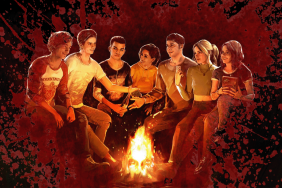Do you ever feel guilty about the decisions you make in video games?
I do. I felt guilty about setting off the Megaton nuke in Fallout 3, but did it anyway because I figured seeing the nuclear explosion would be a lot more interesting than not seeing it. All those people I’d killed, though, all those polygons I’d eviscerated in order to quench my thirst for a mighty explosion made me feel shameful.
Despite that, guilt isn’t an emotion that Grand Theft Auto V wants you to feel while you’re shooting and driving your way through its hate-filled world. Still, I felt a pang of regret when I lined up a dog in the crosshairs of my sniper rifle and gunned it down whilst it was running side-by-side with its owner. I watched its lifeless body skid along the floor as a shot of its blood pumped into the air from its neck in crimson mist and thought to myself “that wasn’t a nice thing to do.”
I’m a relatively kind-hearted soul in reality. My Mom always talks about how I rode my bicycle slowly in the summer, carefully maneuvering around ants on the ground to ensure I didn’t accidentally kill any of them. While age and knowledge has somewhat withered my optimistic outlook on life, I feel like I still possess many of those childhood traits and that I’ve remained good-natured in spite of my growing surliness.
But video games have grown up with me. Where in my youth they primarily pitted good vs. evil and left no room for gray areas, they’ve now adjusted to accommodate those who want to occupy a middle ground. They allow us to live vicariously through the actions of our in-game characters. Video games are fictional material, of course, and our actions in them do not in any way negatively impact the world around us, but do these actions stand to reflect our own morality?
If that is the case, then that doesn’t necessarily mean that a gamer who opts for sociopathic choices in games is on his or her way to appearing on America’s Most Wanted, though I do believe that it reflects the player's mindset and attitude. If you’re a believer in determinism, which I am, then you’ll recognize that the world of a video game posits an environment in which the player’s actions often mould the world in which they’re inhabiting, rather than vice versa as is the case in reality. Yes, open-world, non-linear games such as GTA V and Fallout 3 are still restricted in the confines of the deterministic theory, but they offer the greatest illusion of free will currently available to us. They offer us a playground and tell us that we can do whatever we please in that playground.
Regardless of games that act as an outlet we use to distance ourselves from reality, the aforementioned twitch of guilt I felt when performing a tasteless act in-game leads me to believe that we aren’t as emotionally distant from the characters we assume. Guilt is an emotion, a very real emotion, and for me to feel some semblance of it when exploring a virtual world in the shoes of a fictional character suggests that I am not as mentally detached from my actions as I would perhaps like to believe.
So, is this a bad thing? If decisions we make in games provoke real emotion, then does that give credibility to the argument that they somehow cause violence? I feel guilty when I make a sordid decision in games, but what about those who feel nothing? Are they on their way to a life of crime? In a word: no. At least, I don’t believe so.
Video games offer a world of input and interactivity, something other entertainment mediums don’t provide. Film, music and literature only offer output; their creators have developed their works of art for you to digest, but not for you to participate in. On the other hand, video games require your participation in order for them to function. They evoke many of the same emotions; the sadness one feels when listening to The Smiths’ ‘I Know It’s Over’ is the very same sadness one might feel following the ending of Telltale’s The Walking Dead. But the key difference is that you’re actively involving yourself in The Walking Dead’s narrative, whereas with ‘I Know It’s Over’, you’re simply listening to the story that Morrissey is relaying to you.
I would argue, then, that video games are the creative outlet for the uncreative. That’s not to say that everyone who plays games lacks creativity, but that they are a medium in which those who do not have the passion to pick up a canvas and easel can still express themselves. Much like writing or playing music or sport, we can become proficient at playing games, and other things that we invest ourselves in. I believe that this investment of creative energy is the reason we feel so many different emotions while playing. It's not because games blur the lines between fiction and reality and aim to turn us all into sociopaths. Many do not have an outlet in which to express themselves, and video games offer that.
So yes, I do believe that some of the moral decisions and choices we make in video games reflect our own outlook on life, but I do not believe this to be a negative thing. We all need to let go of ourselves sometimes, and for many people games are their predominant outlet. As Morrissey once sang, ‘In my life, why do I give valuable time to people who I’d much rather kick in the eye?’ and no one ever lambasted him for expressing his desire to boot people in the face, nor should we be criticized for expressing ourselves, no matter how we choose to do so.











